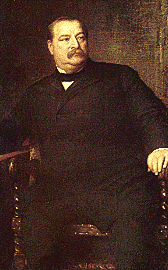|
The 43 Presidents
of the
United States of America

Grover Cleveland
22nd and 24th President
1885 - 1889 and 1893 - 1897

| Born |
March 18, 1837 |
| Birthplace |
Caldwell, New Jersey |
| College |
None |
| Religion |
Presbyterian |
| Ancestry |
English-Irish |
| Occupation |
Lawyer, sheriff |
| Political Party |
Democratic |
| Represented |
New York |
| Term |
March 4, 1885 to March 3, 1889
- AND -
March 4, 1893 to March 3, 1897 |
| Died |
June 24, 1908 |
| Place of Death |
Princeton, New Jersey |
| Buried |
Princeton, New Jersey |
Grover
Cleveland was the twenty-second and twenty-fourth president of the
United States. President Cleveland was named Stephen Grover Cleveland,
but when he was a young boy, he stopped using Stephen and became known only
as Grover Cleveland.
Important events during President Cleveland's
administration were:
-
Geronimo, the
Apache chief, went on the warpath in New Mexico and Arizona on May 17,
1885.
-
The
Naval War College opened in Newport, Rhode Island on September 3,
1885.
-
The
Presidential
Succession Act was approved by Congress on January 19, 1886.
-
The
Statue of Liberty was dedicated on October 28, 1886.
-
A
blizzard covered
the East Coast in snow on March 11, 1888 and killed 400 people.
-
Charles and Frank Duryea built the first gasoline-powered automobile
in America and tested it on September 20, 1893.
-
Workers went on
strike against Pullman on May 11, 1894 and halted railroad traffic
until August 2, when government troops arrested the union leaders and the
workers returned to work.
-
Hawaii became a
republic on July 4, 1894.
-
The
Cuban revolt began on
February 24, 1895.
-
Income tax
was declared unconstitutional on May 20, 1895.
-
Utah was admitted as the
45th state on January 4, 1896.
Grover Cleveland was:
-
the first President born in New Jersey.
-
the only President to lose a
reelection and then get elected. He served two terms, but they
weren't back to back.
-
the second President to be
married while in office and he was married in the White House.
-
the ninth President who lived in
a different state than where he was born.
-
the first President elected
after the Civil War who did not fight in it.
-
the first Democratic President
to be elected after the Civil War.

 

 |





